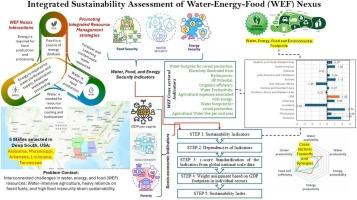对水-能源-粮食关系指标进行综合可持续性评价
IF 3.1
Q2 GEOSCIENCES, MULTIDISCIPLINARY
引用次数: 0
摘要
水-能源-粮食关系强调了关键资源的相互依存关系和通过综合管理办法确保可持续性的必要性。目前的研究重点是美国南部的阿拉巴马州、阿肯色州、路易斯安那州、密西西比州和田纳西州,以分析世界经济论坛Nexus的权衡和协同效应。我们提出了一个综合的世界经济论坛可持续发展指数(IWSI)来对这些州的可持续性进行定量评估。IWSI是通过整合水、能源和粮食部门的标准化指标,以及部门间经济相互作用得出的权重来构建的,以便在单一的综合得分中捕捉权衡和协同效应,从而提供综合的可持续性评估。美国的IWSI值为1.62。田纳西州的IWSI值为2.34,其特点是水资源利用效率高,可再生能源贡献大,农业生产率高。相反,路易斯安那州和阿肯色州分别面临着显著的可持续性挑战,主要原因是能源和水效率低、依赖化石燃料、高排放和大水足迹。阿肯色州在农业方面的水足迹显著,远高于全国平均水平,凸显了该州对灌溉的严重依赖。各州的水力发电条件各不相同,田纳西州在可再生能源使用方面处于领先地位。该研究强调了可持续性方面的区域差异,并强调需要制定有针对性的战略来提高资源效率和可再生能源的采用。利用世界银行和《我们的数据世界》的数据集进行的全球评估凸显了地区之间的差异,为了解地区特有的机遇和挑战提供了见解。本文章由计算机程序翻译,如有差异,请以英文原文为准。

Toward an integrated sustainability assessment of Water-Energy-Food nexus indicators
The interdependence of crucial resources and the imperative for ensuring sustainability through integrated management approaches is underscored by the Water-Energy-Food (WEF) Nexus. The current study focuses on Alabama, Arkansas, Louisiana, Mississippi, and Tennessee in the Deep South USA to analyze the trade-offs and synergies in WEF Nexus. We propose an Integrated WEF Sustainability Index (IWSI) to provide a quantitative assessment of sustainability across these states. The IWSI is constructed by integrating standardized indicators across the water, energy, and food sectors, with weights derived from inter-sectoral economic interactions, to capture both trade-offs and synergies in a single composite score to provide an aggregated sustainability assessment. USA has an IWSI value of 1.62. Tennessee has an IWSI value of 2.34, characterized by efficient water utilization, substantial contributions from renewable sources, and robust agricultural productivity. Conversely, Louisiana and Arkansas encounter notable sustainability challenges, respectively, primarily attributable to low energy and water efficiency, reliance on fossil fuels, high emissions, and large water footprints. Arkansas demonstrates a significant water footprint in agriculture, well above the national average, highlighting its heavy reliance on irrigation. There is variation in hydropower conditions across states, with Tennessee leading in renewable energy use. The study underscores regional disparities in sustainability and emphasizes the need for tailored strategies to enhance resource efficiency and renewable energy adoption. A global assessment using datasets from the World Bank and Our World in Data highlights disparities across regions, providing insights into region-specific opportunities and challenges.
求助全文
通过发布文献求助,成功后即可免费获取论文全文。
去求助
来源期刊

Journal of Hydrology X
Environmental Science-Water Science and Technology
CiteScore
7.00
自引率
2.50%
发文量
20
审稿时长
25 weeks
 求助内容:
求助内容: 应助结果提醒方式:
应助结果提醒方式:


